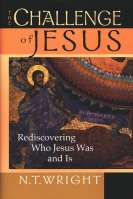N.T. Wright 1999
Chapter 1 – The Challenge of Studying Jesus
Where to start well why not with the word that Wright repeats – necessary. The whole chapter is Wright imploring and explaining why the “Quest for the Historical Jesus” is important not just to the historians but to Christianity as a whole.
How is it important? Well there was a guy called Martin Luther and he did some research on this translation which came up with “do penance” Martin's study realised that it was “repentance” big difference between these huh! Of course the changes that came from this and Luther's other work were somewhat extensive. Wright alludes to the possibilities for not just individuals but for Christianity as a whole when research takes place.
Yet in my experience such historical research usually brings results from people who are trying to refute Jesus existence or that he was less than the Son of God. Either that or it is extreme in the other direction that Jesus was some hologram projected by God not a human but a super-human.
Why do we have this split not just between believers and unbelievers but within Christianity itself?
Historically what has happened is detailed by Wright in his belief that asking the question “Who was Jesus and what did he accomplish?” is necessary, but the way in which it is asked is what results in the answers that we have read in shock or dismay. Wright points to the Enlightenment and specifically to Herman Samuel Reimarus who asked the question about Jesus to try and prove that Christianity is merely a mistake. It is from the Enlightenment that the current situation stems from, its separation of fact from faith by elevating human reason changed the playing field. Jesus was either a simple peasant cynic or a superman. This is a generalisation but it is the effect of the Enlightenment and its belief that the main event of human history was in the eighteenth century and not the events in the first concerning Jesus of Nazareth that were the main event (a rival eschatology - asserts Wright).
Because of the resulting answers coming from the question responses were either for or against and the effect of the enlightenment's split between fact and faith is seen in the divide between liberal and conservative. Despite all of this Wright says that the question asked by Reimarus and the Enlightenment is “necessary” and Wrights reasons are as follows.
God – To ask questions about Jesus and discuss him is to be discussing God. We learned last week in Ogden that any question about Jesus is a question about God as well as a question about who we are (the existential question)
Loyalty to Scripture – If we believe the bible then we should be making sure that we understand it in the context that it is set in. Imagine what people will make of LOL or ROTFLOL in two thousand years time.
Truth – We should not be afraid of the truth and what it actually is and the possible changes that can and will occur when you delve deeply into the question “Who is Jesus and what did he accomplish?” Did you watch compass last sunday night? It was disturbing hearing this message that I thought I was okay with that Jesus was (and is) a Jew. This exploration may freak us out but if we believe “The way, the Truth and the Life – it is Jesus” then why should we be afraid
Commitment to mission – We can answer the questions that will come to us from those who believe as well as those who are trying to find the evidence that it is all a sham. If we know the information and the history surrounding Jesus and the first century we can answer these people. There's that joke on the Vicar of Dibley “Have you read the new book of the bible, you know the Da Vinci Code.”
Wright finishes explaining the situation or state of play as he sees it of the quest. The quest came about from a question that was necessary but asked in the wrong fashion, since then there have been three main streams within the quest headed by Wrede, Schweitzer, and Kahler.
Wrede is the sceptic “we cannot know very much about Jesus, he certainly did not think of himself as the Messiah or the Son of God and the Gospels are basically theological fiction.”
Schweitzer – the middle of the road believing that Jesus being a First century Jew had similar understandings about the end times and how they would come about. Also that the Gospels got Jesus character right.
Kahler – Saw that the quest was just a way for historians to imagine up stuff about Jesus.
Wright places himself in the middle ground of course yet he continues to explaining that we cannot just discount the arguments that are put by those we consider to be wrong. That only in joining the quest and producing arguments that lead to theories that disprove them that we can correct them.
It is because of these reasons and the growth that can come from this quest that Wright is pushing it so hard. That this should never be considered a finished work, that the previous generation worked it all out before. Wright believes that every “generation has to wrestle afresh with the question of Jesus” I agree.
If you want to read my long version it can be found at my blog -
http://thischristianguy.blogspot.com/2010/03/tutorial-presentation-challenge-of.html
http://vialogue.wordpress.com/2008/12/25/the-challenge-of-jesus-notes-review/
http://www.gracecathedral.org/forum/for_20060514.shtml – Wright with Anne Rice 2006
Other stuff I found its interesting to read.




